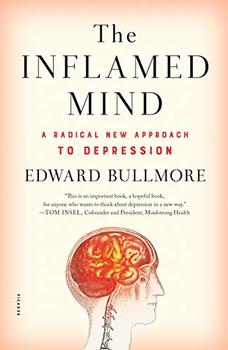Summary | Excerpt | Reviews | Beyond the Book | Readalikes | Genres & Themes | Author Bio

A Radical New Approach to Depression
by Edward Bullmore
So the science of immuno-psychiatry has matured to the point that it can help me answer the question of how I became depressed after the dentist in a new and logically seamless way. I don’t need a ghost in the machine. I can plausibly argue that the surge of cytokines caused by my root canal surgery sent an inflammatory signal across the BBB to cause a change in the emotion-processing networks of nerve cells in my brain, which in turn caused an episode of depression that led my mind to dwell on the grave. There is credible experimental evidence for every step of this dualism-defying, extraordinary explanation. But still it is not entirely complete. There are gaps and anomalies in the existing evidence base, to be sure, as there always will be in any rapidly advancing area of science. But even if we had a complete answer to the question “how”, we would still want to know the answer to the question “why”.
The only scientifically acceptable answer to that question is in terms of evolution. Why does inflammation cause depression? It can only be because of natural selection. There must be some sense in which a depressive response to infection or any other inflammatory challenge is (or was) advantageous for our survival. And we must have inherited genes that were naturally selected in previous generations to make us more likely to benefit from a depressive response to inflammation. If I want to, I can reasonably speculate that the reason why I became momentarily depressed after the dentist is because I have inherited genes that helped my ancestors survive infections in the past. This genetic inheritance might well have helped me recover from the minor trauma of root canal treatment by aggressively killing off any infectious germs and by dictating that I should stay in bed and conserve my energy while that happened.
Of course, the real importance of these linked new sciences of neuro-immunology and immuno-psychiatry is not that they give me a different way of explaining why I don’t like going to the dentist. What matters much more is that once we have begun to map a path to follow from the body, via the immune system, to the brain and the mind – once we have articulated a post-dualist concept of the inflamed mind – we should be able to find entirely new ways of dealing with mental health disorders.
The revolution will not be televised
Depression, schizophrenia, autism, addiction, Alzheimer’s disease… there is a long and mournful list of disorders that psychiatrists, clinical psychologists and neurologists ordinarily treat either as if they were “all in the mind” or as if they were “all in the brain”. Let’s say I had not bounced back to work the day after the dentist. Let’s imagine I had become progressively more withdrawn and melancholic until my wife had eventually persuaded me to see a doctor. What would have happened? My GP would probably have asked me a few questions about my state of mind and then offered a course of psychotherapy (to resolve my issues about mortality) or a prescription of anti-depressants (to correct some notional imbalance of serotonin or other neurotransmitters in my brain). It is unlikely my doctor would have attached much diagnostic significance to the root canal story. It is virtually certain that he would not have ordered a blood test to measure cytokine levels, or to see if I had genetic risk factors for a depressive response to inflammation. It is inconceivable that he would have recommended an anti-inflammatory drug (like aspirin) instead of an anti-depressant (like Prozac). In all probability, I would have been sensibly, competently, traditionally treated as if my mood had nothing to do with my immune system. Just like I had traditionally treated Mrs P.
Scientifically there may still be questions to resolve about causality but the link between inflammation and depression is indisputable. So why am I so confident that the doctor I might have consulted about post-dental depression would pay no attention to my immune system? The answer is partly just that medicine is a conservative, highly regulated profession. It is not unusual for changes in practice to lag several decades behind conceptual advances in biological science. A good example of the sometimes slower-than-hoped-for pace of medical progress is the real-life impact of the double helix.
Excerpted from The Inflamed Mind by Edward Bullmore. Copyright © 2018 by Edward Bullmore. Excerpted by permission of Picador. All rights reserved. No part of this excerpt may be reproduced or reprinted without permission in writing from the publisher.
Your guide toexceptional books
BookBrowse seeks out and recommends the best in contemporary fiction and nonfiction—books that not only engage and entertain but also deepen our understanding of ourselves and the world around us.